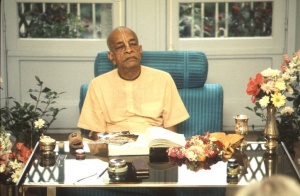CC Adi 7.50: Difference between revisions
No edit summary |
(Vanibot #0054 edit - transform synonyms into clickable links, which search similar occurrences) |
||
| Line 17: | Line 17: | ||
<div class="synonyms"> | <div class="synonyms"> | ||
''kateka'' | ''[//vanipedia.org/wiki/Special:VaniSearch?s=kateka&tab=syno_o&ds=1 kateka]'' — how much; ''[//vanipedia.org/wiki/Special:VaniSearch?s=śuniba&tab=syno_o&ds=1 śuniba]'' — shall we hear; ''[//vanipedia.org/wiki/Special:VaniSearch?s=prabhu&tab=syno_o&ds=1 prabhu]'' — O Lord; ''[//vanipedia.org/wiki/Special:VaniSearch?s=tomāra&tab=syno_o&ds=1 tomāra]'' — Your; ''[//vanipedia.org/wiki/Special:VaniSearch?s=nindana&tab=syno_o&ds=1 nindana]'' — blasphemy; ''[//vanipedia.org/wiki/Special:VaniSearch?s=nā&tab=syno_o&ds=1 nā] [//vanipedia.org/wiki/Special:VaniSearch?s=pāri&tab=syno_o&ds=1 pāri]'' — we are not able; ''[//vanipedia.org/wiki/Special:VaniSearch?s=sahite&tab=syno_o&ds=1 sahite]'' — to tolerate; ''[//vanipedia.org/wiki/Special:VaniSearch?s=ebe&tab=syno_o&ds=1 ebe]'' — now; ''[//vanipedia.org/wiki/Special:VaniSearch?s=chāḍiba&tab=syno_o&ds=1 chāḍiba]'' — give up; ''[//vanipedia.org/wiki/Special:VaniSearch?s=jīvana&tab=syno_o&ds=1 jīvana]'' — life. | ||
</div> | </div> | ||
Latest revision as of 19:16, 19 February 2024

A.C. Bhaktivedanta Swami Prabhupada
TEXT 50
- kateka śuniba prabhu tomāra nindana
- nā pāri sahite, ebe chāḍiba jīvana
SYNONYMS
kateka — how much; śuniba — shall we hear; prabhu — O Lord; tomāra — Your; nindana — blasphemy; nā pāri — we are not able; sahite — to tolerate; ebe — now; chāḍiba — give up; jīvana — life.
TRANSLATION
“How long can we tolerate the blasphemy by Your critics against Your conduct? We should give up our lives rather than hear such blasphemy.
PURPORT
One of the most important instructions by Śrī Caitanya Mahāprabhu regarding regular Vaiṣṇava behavior is that a Vaiṣṇava should be tolerant like a tree and submissive like grass.
- tṛṇād api su-nīcena taror iva sahiṣṇunā
- amāninā māna-dena kīrtanīyaḥ sadā hariḥ
“One should chant the holy name of the Lord in a humble state of mind, thinking oneself lower than the straw in the street; one should be more tolerant than a tree, devoid of all sense of false prestige and ready to offer all respect to others. In such a state of mind one can chant the holy name of the Lord constantly.” Nevertheless, the author of these instructions, Lord Caitanya Mahāprabhu, did not tolerate the misbehavior of Jagāi and Mādhāi. When they harmed Lord Nityānanda Prabhu, He immediately became angry and wanted to kill them, and it was only by the mercy of Lord Nityānanda Prabhu that they were saved. One should be very meek and humble in his personal transactions, and if insulted a Vaiṣṇava should be tolerant and not angry. But if there is blasphemy against one’s guru or another Vaiṣṇava, one should be as angry as fire. This was exhibited by Lord Caitanya Mahāprabhu. One should not tolerate blasphemy against a Vaiṣṇava but should immediately take one of three actions. If someone blasphemes a Vaiṣṇava, one should stop him with arguments and higher reason. If one is not expert enough to do this he should give up his life on the spot, and if he cannot do this, he must go away. While Caitanya Mahāprabhu was in Benares or Kāśī, the Māyāvādī sannyāsīs blasphemed Him in many ways because although He was a sannyāsī He was indulging in chanting and dancing. Tapana Miśra and Candraśekhara heard this criticism, and it was intolerable for them because they were great devotees of Lord Caitanya. They could not stop it, however, and therefore they appealed to Lord Caitanya Mahāprabhu because this blasphemy was so intolerable that they had decided to give up their lives.